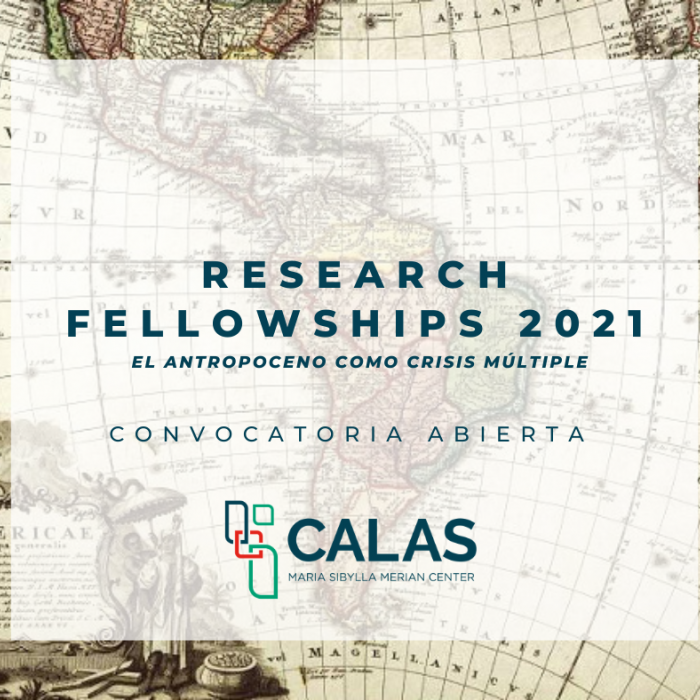The Maria Sibylla Merian Center of Advanced Latin American Studies (CALAS) is announcing up to five research scholarships located at the headquarters of CALAS in Guadalajara, Mexico. The scholarships are connected to the think tank “The Anthropocene as Multiple Crises: Latin American Perspectives” and involve residencies of 3 to 8 months between March of 2022 and August of 2023. In accord with the program of investigations of CALAS, it is expected that the applicants contribute to the development of new methodological and analytical foci to understand the Anthropocene from Latin American, and the Caribbean and from the Social Sciences and the Humanities. During their stay in Guadalajara, applicants are asked to write an essay of 35,000 words with a unique and innovative perspective about the theme of the Anthropocene.
Thematic Focus
The concept of the Anthropocene was coined by Crutzen, a Dutch atmospheric chemist, and Stoermer, an U.S. biologist, in May 2000. Both scientists observed the profound modifications humans had been making in the environment and intended to express the planetary scope of these anthropogenic changes with the neologism. The Anthropocene, they suggested, was hence a new geological epoch in which humans, by their sheer numbers, put unprecedented amounts of CO2 into the atmosphere through the mass-use of fossil fuels and by the large-scale extraction of non-renewable resources. Further processes by which humans have now come to change all spheres of the planet (such as plastic pollution, ocean acidification, species extinction, water source depletion etc.) form part of the multiple crises of the Anthropocene.
From the standpoint of Latin America and the Social Sciences/Humanities, the Anthropocene and its pre-history cannot be separated from coloniality, the emergence of the capitalist world system, and racial capitalism. The criticism of European/Western capitalism as a driver of the Anthropocene goes hand in hand with a radical criticism of European/Western modernity and the recognition that the Anthropocene puts an abrupt end to teleological notions of “development,” “progress,” and “civilization” of the European model.
In the Global North, the discussion of the Anthropocene as a new geological epoch quickly focused on the question of when this new age should begin. Geologists have established specific criteria for determining such epochs, which concern data from sediments, and do not necessarily coincide with the dating criteria of historians. Nevertheless, the beginning of the Anthropocene is now proposed with broad agreement to begin from 1950 onwards under the term “Great Acceleration” named due to the rapid increase of polluting activities that make up the crisis of the Anthropocene occurring at that time. However, if there is a “Great Acceleration,” this also implies a phase of slower aggregation of these “anthropocenic” processes. Precisely because so many of the extractivist-capitalist practices that are a part of the Western, “Enlightened” energy model, and cultural setup had their origins in Latin America and the Caribbean, one is compelled to look at the pre-history of the Anthropocene since 1492.
We would like to encourage the following reflections: How can one conceptualize the temporalities of the concept of the Anthropocene? And what is its impact for historical thinking? What could be the specific impact of the Social Sciences and Humanities in the Anthropocene-debate? What insights and theoretical-conceptual inputs might be found from different Latin American perspectives? How are racial and environmental justice implicated in the Anthropocene? And how can we break away from historically-grown systemic racism, vulnerability, and inequalities? How can we rethink interrelations between humans and nature? How do different social actors cope with the multiple crises of the Anthropocene? And what creative (even if only partial) solutions could they find that can stand as models for other regions of the world?
For more information on CALAS, go to the Center's website: www.calas.lat
Application
The following documents are required in English or Spanish:
- Completed Application Form.
- Cover letter explaining how the project fits into the CALAS research program and what your expectations are.
- Presentation of an innovative publication project (long essay) and a defense of the contribution to the Anthropocene debate, including timeline and work plan, with a maximum of 10 bibliographic sources (max. 5 pages/2,000 words).
- Two-page curriculum vitae with list of relevant publications.
- Copy of doctoral certificate.
Important dates:
- Opening of the call: May 1, 2021.
- Closing date: July 12, 2021.
- Decision: September 30, 2021.
- Start of the fellowship: between March 2021 and May 2023. (The laboratory closes in August 2023).
Submission of documents:
Applications (in Spanish or English) should be sent as a single pdf-file to the following email address: calas-antropoceno@uni-bielefeld.de, Reference: CALAS Antropoceno
Due to the number of applications, rejections cannot be justified.
For more information:
Centro Maria Sibylla Merian de Estudios Latinoamericanos Avanzados, tel. +52 33 3819 3000 (ext. 23594), Ann-Kathrin Volmer: calas-antropoceno@uni-bielefeld.de


